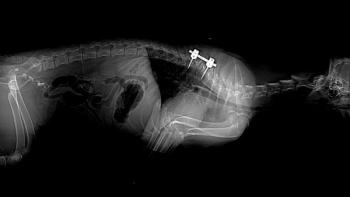
Clinical trial underway for feline herpesvirus treatment in shelter cats
Shelter cats with FHV-1 are more likely to be euthanized than adopted. The ultimate goal of this new study is to give shelter cats a better chance at a full and healthy life.
Experts believe
To save shelter cats’ eyes and lives, Morris Animal Foundation–funded researchers at Louisiana State University School of Veterinary Medicine (LSU SVM) are conducting a clinical trial of three common antiviral drugs to determine which is best suited to treat this highly contagious disease in animal shelters.
“FHV-1 is a huge welfare issue for shelter cats and it is important that we find a viable method to address it,” Morris Animal Foundation Chief Scientific Officer Janet Patterson-Kane, BVSc, PhD, FRCVS, said in a
While FHV-1 is a major cause of upper respiratory disease in the feline population, it’s also the most common cause of conjunctivitis. In extreme cases, the disease can cause corneal scarring and vision loss.
To help veterinarians more effectively treat this potentially blinding condition in shelter cars, researchers will conduct a clinical trial with more than 120 cats with evidence of FHV-1 eye infections from shelters in the Louisiana area. Each cat will receive one of three currently available antivirals (cidofovir, ganciclovir or famciclovir) or a placebo.
The researchers will score each cats’ eyes before and after one week of treatment to see whether any improvement has been made, as well as take eye swabs to measure the efficacy of each treatment. Researchers will then assess whether the virus develops any resistance to the antivirals by growing the swabbed samples in a lab in the presence of an antiviral. If the virus continues to grow, that could demonstrate resistance.
Researchers will also sequence the DNA of any bacteria isolated from affected cats to determine whether that bacteria are related to the therapeutic response. This will assess the impact of secondary eye infections, from which many cats with FHV-1 suffer.
“This virus can be debilitating, with outcomes pretty variable from cat to cat,” said Andrew Lewin, BVM&S, MRCVS, DACVO, assistant professor at LSU SVM and principal study investigator. “We want to be able to make a meaningful recommendation for veterinarians to improve the welfare of these animals.”
Newsletter
From exam room tips to practice management insights, get trusted veterinary news delivered straight to your inbox—subscribe to dvm360.






